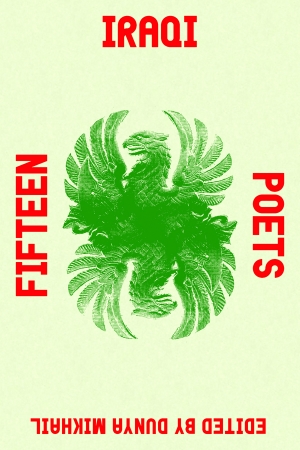So we need poets to challenge received notions, tell us what we don’t know, ask the questions we can’t answer, and wake us up to both doom and Utopia.
— Translator and essayist Eliot Weinberger
Over the decades, the United States has caused extreme damage in Vietnam, Nicaragua, and Iraq. In each of these nations, the populace esteems poetry in a way that U.S. citizens could scarcely imagine. While in a Chinese prison, Ho Chi Minh wrote poetry, while Minister of Culture Ernesto Cardenal and his associate Daisy Zamora sponsored poetry workshops all over the country after the revolutionary triumph.
Dunya Mikhail, author of The War Works Hard, has edited a short and powerful collection of poems, Fifteen Iraqi Poets, published by New Directions, famous for its promotion of international modernism. The collection proceeds chronologically from Badr Shakir al-Sayyab (born in 1926) to Siham Jabbar (born in 1963). Mikhail acknowledged, “It was a nearly impossible task trying to pick only fifteen grains of sand from a shimmering desert.”
In her preface, she mentions the subversive free verse movement and experiments in prose poems which began in Iraq in the 1940s. These constituted an unprecedented transgression of the principles of classical Arabic poetry. Mikhail also links this recent Iraqi poetry to ancient Sumerian poetry: “The words from Sumer in southern Iraq were our first cries of poetry, etched in a cuneiform script onto clay tablets, the lines unfolding in one long prose poem without rhymes but with an ‘inner rhythm.’ The texts are shaped by a narrative, but the repetition of lines and the intensity of the images are unmistakably lyrical. Most of the narratives are broken into fragments, though it is often impossible to discern if the fragmentation is intentional or due to missing or crumbling tablets.”
Mikhail provides interesting background on each of the fifteen poets. Badr Shakir Al-Sayyab translated Louis Aragon, Nazim Hikmet, and T.S. Eliot into Arabic. In addition to being one of the pioneers of free verse, Nazik Al-Malaika was a strong proponent of women’s rights (she and her husband founded the University of Basra). Yousif Al-Sa’igh was raised a Christian, then converted to Islam, after which he converted to Marxism, before finally throwing his lot in with the Baath party. Sargon Boulus translated Ho Chi Minh’s poetry into Arabic after he saw a large anti-Vietnam war protest in San Francisco. Taleb Abd Al-Aziz lost his brother in the Iran-Iraq War, and about his poem “My Brother’s War,” he noted, “I wrote the poem in fifteen minutes but with burning tears.”
The following poem, “Separation” is by the Iraqi Kurd Sherko Bekas, who lived as an exile in Sweden for a number of years.
If they deprive my poems
of flowers
one of my seasons will die.
If they deprive my poems
of my beloved
two of my seasons will die.
If they deprive my poems
of bread
three of my seasons will die.
If they deprive my poems
of freedom
my whole year will die
as will I.
Reading these poets, I thought of a friend of mine, Fatima Rhodes, who has recently composed poems marked by intense compassion and searing anger. I sense in her and others among us that, indeed, poetry is something elemental, vital, as necessary as flowers, beloveds, bread, and freedom.
Past and present under the various forms of tyranny dominating their country, Iraqi poets have risked their lives in pursuing their art. Many fled to other lands; others stayed and tried to manage somehow, through the years of wars, sanctions, and chaos. Ra’ad Abdul Qadir was one of those who remained in Iraq. He died young at 50. His widow gave to his friends a collection of the writings he’d left behind. They discovered 11 volumes of unpublished poems.
